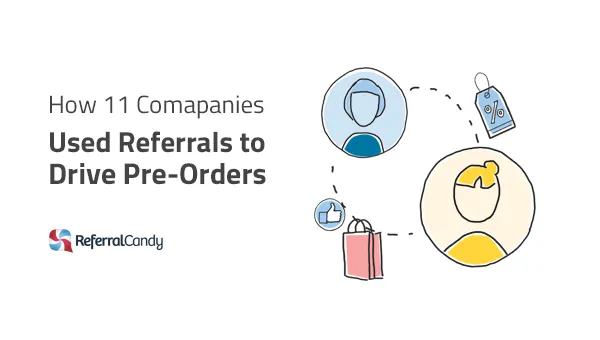
Consider what a successful pre-order campaign can do for your brand. If done well, you can use it...
By utilising and maximising word-of-mouth.
When you have a pre-order campaign, your product might not be ready for the public yet. Heck, it might still be in its production stages!
But you need people to know about it. In some cases, you might even need their help to make your product a reality. So you have to let as many people know about it as possible.
That's where word-of-mouth becomes extremely crucial.
Here are 11 examples of how companies utilized word-of-mouth referrals to spread the word and generate hype for their products:

The Plastc card is a smart card that combines 20 of your most frequently-used cards into one. Any card with a barcode, magnetic strip, contactless or chip and pin feature can be stored into Plastc.
In 2014, Plastc hit a record high in their pre-order campaign, selling over $5.2 million in their first week!
Referral program details: One of their customer acquisition strategies was a "Give $20, Get $20" referral program. Each referred customer enjoys a $20 discount when purchasing their Plastc Card, and the advocate also receives a $20 Amazon gift card.
The Amazon gift card might sound like a weird move at first, but it makes sense.
Why said reward: Plastc is a new company trying to sell their very first product, so giving out cash rewards to all their pre-order customers isn't a good idea. Giving them 20 dollars to spend at the world's biggest ecommerce site instead is probably the next best thing.
Also, $20 is pretty generous, since a customer can obtain multiple gift cards for referring his friends!

Customers can purchase a pack of 4 Pixie Points for $39.95, at a 40% discount of the retail $69.95. For customers who buy more than one pack, addition promo codes provide further discounts of $5 and $10 for two and three packs respectively.
Referral program details: Advocate gets $5 credit for each successful referral within a 6-day window. They can potentially get a pack of 4 Pixie Points for free with 8 successful referrals.
Why said reward: Because of Pixie's potential to create a digital map of all your belongings, customers would want as many Pixie Points as possible. And let's face it: four Pixie Points isn't enough. Thus, rewarding referrals with discounts incentives future purchases, flowing nicely with the predicted customer behavior.

The Lumo Lift is a posture corrector and activity tracker, and works by vibrating when it senses that you're slouching.
You simply attach the nifty little device to your shirt, and it'll remind you to sit up straight or stand tall.
But it's not just about correcting your posture so you can be healthier, it's about making you feel more confident too. By sitting up straight and presenting a more confident posture, you will feel more confident.
The Lumo Lift raised $900,000 in less than a month, which is approximately$32,000 a day. Their first Kickstarter campaign for the Lumo Back raised $5,000 per day.
Referral program details: $7 credit for every friend that purchases a Lift through your link, so you can get a free Lift when 10 of your friends buy a Lift.
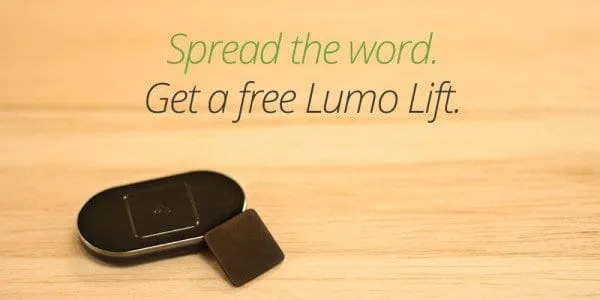
Why said reward: Giving out credit works to incentivize future repeat purchases, but it has a different function when it comes to pre-orders. As customers are allowed to refer their friends before purchasing, the credits also act as a discount for their own purchase.
This works when the products are slightly more pricey; like the $59 - $79 Lumo Lift.

Navdy is a small dashboard projector device that displays important messages like its a hologram.
Drives can use voice or hand gestures to interact with the display, allowing them more focus on the road in front of them. It has been called the "Google Glass for your car".
Navdy managed to hit $1 million in the first week of pre-orders, which they held on their own site. CEO Doug Simpson stated they had hoped to hit $500,000 to $1 million, but managed to get $6 million instead.
Referral program details: According to their blog, Navdy was set at an introductory price of $299, at a 40% discount from the actual retail price of $499. Advocates get a 10% discount refund of $30 for each referred friend who buys Navdy. This meant that advocates who successfully referred 10 friends could get a Navdy for free.
Why said reward: Like the Lumo Lift, a discount refund helps to ease the burden of paying almost $300 for Navdy. In addition a $30 discount does sound quite generous.
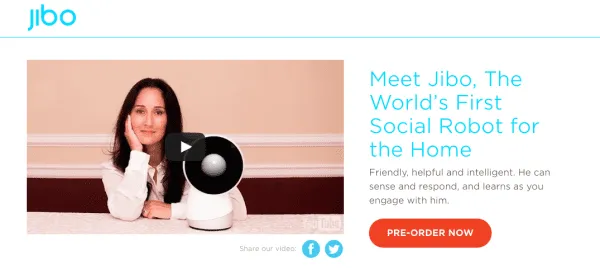
Ever wished you could have a digital house assistant to help you out?
With the Jibo, your wish can now become a reality.
It reminds you of incoming messages on your phone, helps you take family photos, host video calls, and even reads bedtime stories to your children.
Their crowdfunding campaign on Indiegogo managed to raise $2.3 million, which amounts to about 4,800 pre-ordered Jibos.
Referral program details: The Jibo was priced at $499. Customers could enjoy a $150 refund for their first three successful referrals. For each successful referral after that, they would enjoy an additional $50 off. In other words, 10 successful referrals would allows you to get Jibo for free.
Why said reward: It is interesting to note how advocates only receive their first referral reward after referring three friends.
Since Jibo is priced at almost $500, and advocates can only reap their first reward after three referrals, they would be motivated to spread the word.
The more people know about Jibo, the higher their chances of finding three friends to buy it!
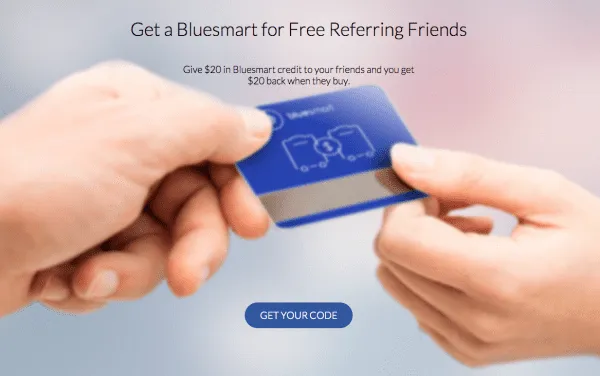
When we think of travelling, one thing we all hate is going through customs.
Having to weigh your luggage, and worrying about it getting lost, are just some of the things we all hate about flying.
But with Bluesmart, all your troubles will go away: it locks your luggage when you're away from it, lets you track its location, charges your phone or tablet, and even weighs itself!
It's no surprise that they managed to raise $2.1 million from their Indiegogo campaign, and about $500,000 in pre-orders from the Bluesmart website after the campaign.
That's more than 7000 pre-ordered Bluesmart luggages.
Referral program details: After pre-ordering a Bluesmart luggage, customers will receive a personalized referral link. Each referred friend gets a $20 discount for pre-ordering a Bluesmart luggage, while the advocate gets a $20 cash refund. With enough referrals (approximately 17), advocates can get a free Bluesmart luggage.
Why said reward: Offering discounts to your referred friends is a nice touch, especially since the product costs more than $300. While it's unlikely that anyone will refer enough people to enjoy a free Bluesmart, the $20 incremental cash refund goes a long way in making the Bluesmart more affordable.

Luna is a smart mattress cover with the desire to improve your sleep quality.
It comes with sensors that measure your heart rate, breathing patterns and even has microphones to record your snores. It also has dual temperature controls to suit individual heat preferences on either side, and wakes you up when you'll feel the least tired.
During their Indiegogo campaign, the Luna Team received more than 5,000 pre-orders, and raised more than $1 million.
Referral program details: Luna's first referral program enabled advocates to get a Luna mattress cover for free after referring five friends. Their bed covers range from $265 to $305, so that would mean an approximate $50 to $60 discount per referral.
Their new referral program rewards advocates with $25 refund credit for the first successful referral, and $10 for each subsequent referral.
Why said reward: Luna's first referral program was extremely generous, and likely contributed to a lot of word-of-mouth. However, it didn't seem sustainable, plus it required customers to make at least five successful referrals, or else they wouldn't get any rewards.
These reasons were probably why they updated their referral program later on.
Their new referral program strongly encouraged customers to make at least one successful referral, so they can enjoy the bigger referral reward. As for why they offered a significantly lower reward for subsequent referrals, my guess is that they want to encourage customers to share but not too much.
They might have production constraints, and do not want to push back their delivery dates due to overwhelming demand.
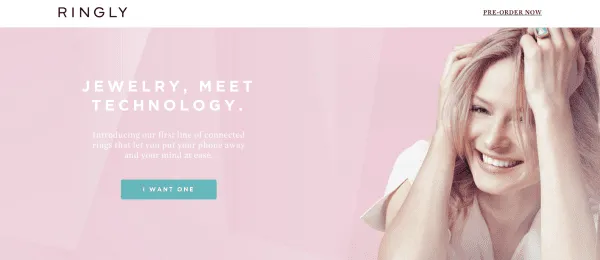
Ringly are ladies' rings that are as smart as they are beautiful. In fact, they hardly resemble the typical "smart" device that we've come to expect.
The rings come with 4 vibration patterns, each representing a different type of alert: an incoming call, message or push notification. Each alert also corresponds to a specific color, which will be displayed on a small bulb by the side of the ring.
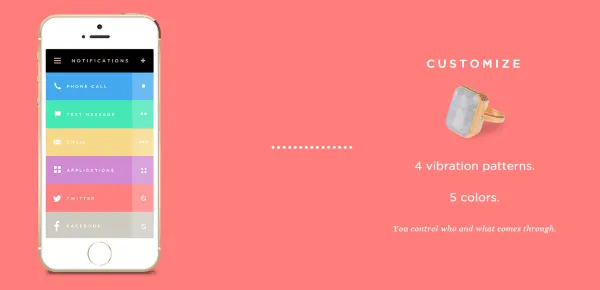
This way, if you are expecting a call, you won't have to constantly check your phone each time it rings; your ring will notify you accordingly.
According to an email sent by Ringly's co-founder, Christina Mercando, they managed to hit their $60,000 crowdfunding target in less than 8 hours!
The most mind-blowing part is: their campaign wasn't held on Kickstarter or Indiegogo, but their own site.
While this meant that they didn't have to give a cut of their funds to crowdfunding platforms, it also meant that they had to reach out to potential customers all by themselves.
Referral program details: Each successful referral would earn you $15, allowing you to get a free Ringly after 13 referrals.
Here's a tweet that illustrates their previous referral program, which allowed advocates to get a free Ringly with 10 referrals:
Why said reward: While the referral conditions are fairly similar to some of the other examples (10+ referrals for a free product), Ringly's customer acquisition story is truly phenomenal.
I believe it all comes down to the premise of Ringly itself: the ring looks like it belongs in a jewelry store, and the fact that it is actually a smart wearable makes it an excellent conversation-starter.
This is how I think the conversation would start:
Hey, I just saw this gorgeous ring, and you won't believe what it actually does!
Many wearable tech products dip their fingers into both fashion and technology, and their products end up looking a little like both. Few products have ever managed to look distinctly fashionable, with no traces of technology.
Which can be a problem when a lady wants to go on a classy night out, but that smartwatch or smartband would spoil the whole look. That's where the Ringly comes in: it looks nothing like a wearable tech device, and yet it has the functionalities of one.
Personally, I think it's a great move, and possibly the main reason why it's been such a huge pre-order success.
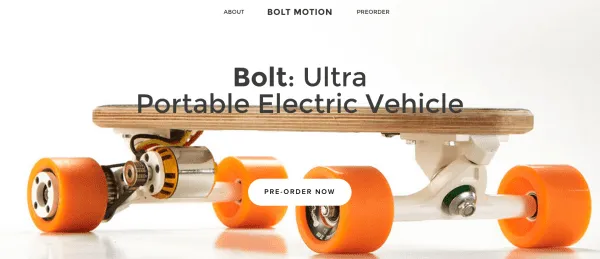
Bolt is the smallest and lightest electric skateboard on the market. It measures 23.5 by 10 inches, and weighs only 8.8 lbs.
But despite its size, the Bolt can carry you for 6.5 miles at 10 mph on just a 1-hour charge! On a full charge, Bolt will gladly go at up to 13 mph.
You can even control your Bolt remotely with your phone via a Bluetooth LE connection!
Needless to say, their campaign was funded successfully on Indiegogo, receiving more than 150% of their funding target.
Referral program details: Bolt offers advocates a chance to get the Bolt for much cheaper (or even for free). Every referred friend who pre-orders a Bolt provides the advocate with a 10% discount; 10 successful referrals would entail a free Bolt.
Why said reward: Bolt is the priciest of all the products listed here ($599 for pre-order; $999 for retail), so a 10% discount for each referral would knock the price down by $60. So technically, Bolt's advocates get the most out of the "10 referrals for a free product" referral program, as compared to the other products in this list.
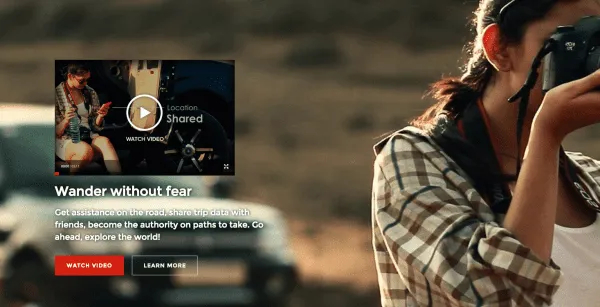
CarIQ is a smart diagnostics device that tells you everything you'll need to know about your car.
It is based on the idea that consumers now know more about what they want, and are taking steps to understand the product they're buying. However, they are clueless as to what goes on inside their car after purchase.
With CarIQ, a device that drivers simply plug into a port beside their driving wheel, they'll be able to know all about their car: engines, ABS, airbags, etc. It also lets you know how you're driving, and gives you tips to improve your mileage.
At a pre-order price of only Rs. 5999 (approx. USD $94), I can already imagine the amount of savings from sending my car in for repairs before it's too late.
Referral program details: Not much is known about their referral program, only that advocates can "get exclusive CarIQ goodies for both you and your friend":
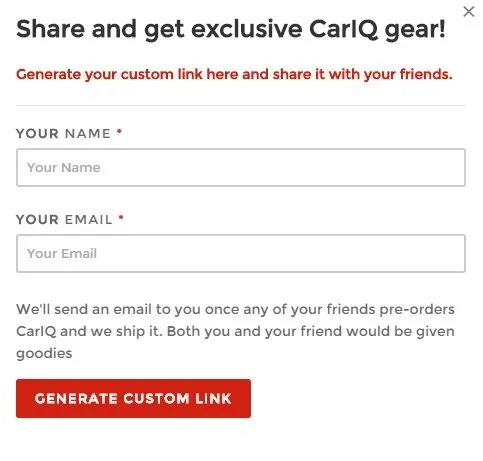
Why said reward: CarIQ isn't a repeat purchase product, nor is it expensive enough to encourage advocates to refer for discounts. For a powerful device that's priced below $100, there really isn't much you can offer to your advocates to encourage them to refer more.
Perhaps that's why a referral reward shrouded in mystery might be more effective. Since advocates won't know what's in store for them, the only to find out is to actual refer.
People have an innate desire to satiate curiosities, hence it can be an effective marketing tool.
The Grid isn't a normal website builder; it builds your website by itself. All you have to do is tell it what you want, and it'll use AI algorithms to do the rest.
It'll help you crop your photos perfectly, color-correct photos on a page to suit a unified color theme, and reorganize itself as you upload more content. This removes the need to spend senseless hours choosing templates and wondering if the navigation buttons should be grey or yellow.
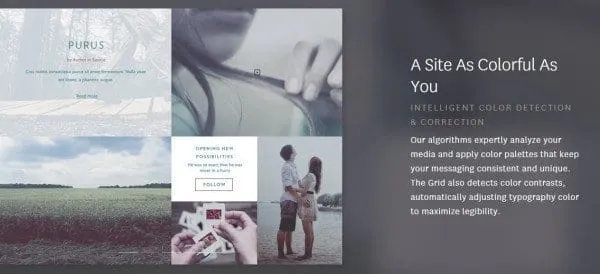
Every customer who purchases membership for The Grid becomes a "founding member", where they'll receive a lifetime of discounted monthly membership of $8/mth (usual price: $25) and a limited-edition NFC tag to share their site with friends easily. Currently, there are more than 40,000 founding members.
The Grid held their own crowdfunding campaign, where their $70,000 target was crushed in 24 hours.
Referral program details: All founding members receive a unique referral code, and advocates receive a refund of $32 for each referred friend who becomes a founding member too. This means that advocates can get their money back in just three referrals.
Why said reward: Giving away free first-year subscriptions to The Grid for three referrals is a very attractive deal, and is bound to get spread. Of course, this works in tandem with The Grid's concept of being an automated website builder.
Interestingly, the Grid doesn't state what advocates might receive if they make more than three referrals. It is safe to assume that there might not be any rewards for the fourth referral onwards.
However, I do see a potential draw in referrals despite the absence of referral rewards. By signing up, customers are locked in for a lifetime membership fee of only $8, as compared to the normal $25 that non-founding members will have to pay in future. Customers who sign up now can enjoy annual discounts of $204, which is huge in the long run.
I think that is pretty mind-blowing, and definitely worth telling your friends about; with or without referral rewards.
While crowdfunding sites have an established user base, and hence are good places to start, Lumo founder and CEO Monisha Perkash has found that hosting a pre-order campaign yourself has one core advantage.
As customers interact with your company on your site, "you end up having a closer relationship with your customers. You can engage them more without having a third party between you, and you can also develop your own brand and messaging, … and make it consistent with what you want to communicate."
All the products listed above are vastly different from each other, and target different types of consumers. But one thing that have in common is that they understand the way their customers would react to their products.
By offering credits for repeat-purchase products like Pixie, and referral refunds for expensive high-risk items like the Bolt, companies are able to appeal to their customers more effectively, and encourage more sharing.
_____
Read Next: How 10 Companies Generated Massive Word-Of-Mouth Through Newsjacking
As a finalist in Esquire's Best Dressed Real Man contest, Samuel is ReferralCandy's fashion eCommerce expert and resident sartorialist. He is obsessed with human behavior, social psychology, and handstands. He is also the lead calisthenics trainer at Weightless.
Grow your sales at a ridiculously
lower CAC.